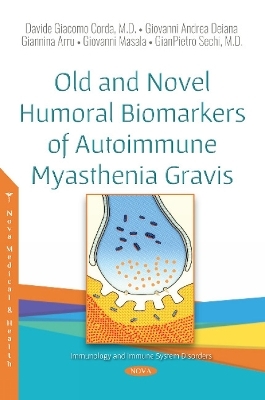
Old and Novel Humoral Biomarkers of Autoimmune Myasthenia Gravis
Seiten
2018
Nova Science Publishers Inc (Verlag)
978-1-5361-3836-8 (ISBN)
Nova Science Publishers Inc (Verlag)
978-1-5361-3836-8 (ISBN)
Autoimmune Myasthenia Gravis (MG) is mediated by pathogenic autoantibodies to components of the postsynaptic muscle endplate at the neuromuscular junction. Due to the clinical heterogeneity of the disease, there is a great need for objective biomarkers for diagnostic as well as therapeutic purposes. Humoral biomarkers of MG can be divided into two categories: 1) autoantibodies; and 2) other immune-related molecules including inflammatory proteins, microRNA, HLA genes. Regarding autoantibodies, the radio immuno assay (RIA) allows for the detection of IgG1 and IgG3 antibodies directed against the nicotinic acetylcholine receptors (AChRAb) in 85% of the patients with generalized MG, but only in 50% of those with the ocular form. Treatment with acetylcholinesterase inhibitors is very helpful, although immunosuppressive therapy is frequently necessary. Thymoma or thymic hyperplasia can occur, implicating surgery. In AChRAb negative generalized MG patients, a very variable percentage has IgG4 antibodies towards muscle specific tyrosine kinase (MuSKAb): typically, bulbar weakness is the first symptom often associated with neck and respiratory involvement. Acetylcholinesterase inhibitors are less effective and induce frequent side effects; first and second line suppressive treatments are commonly required. More rarely, IgG towards low density lipoprotein receptor-related protein 4 (Lrp4Ab), agrin or cortactin are detected: if there are not associated AChRAb or MuSKAb, often patients present with milder forms of MG. Few patients have been demonstrated positive to AChRAb or to other autoantibodies with the more sensitive cell based assay. Finally, titin and ryanodine receptor antibodies can occur in association with AChRAb MG, indicating the possibility of thymoma or, in the context of late-onset myasthenia gravis, severe disease with a need for long-term immunosuppression and no response to thymectomy. In regards to immune-related molecules, two recent studies reported increased serum levels of a proliferation-inducing ligand (APRIL), cytokines IL-19, IL-20, IL-28A and IL-35, matrix metalloproteinase 10 (MMP-10), which is a member of the metalloproteinase family, transforming growth factor alpha (TGF- ), a growth factor that has important roles for epithelial proliferation and differentiation, and the extracellular newly identified receptor for advanced glycation end-products binding protein (EN-RAGE, also known as protein S100-A12), a protein that binds to calcium, zinc and copper. These three last proteins are involved in the cell cycle progression and differentiation, and play multiple roles in immunity response. Circulating microRNAs (miRNA) have been reported to be potential biomarkers in some MG patients; in particular, miR-150-5p and miR-21-5p for AChRAb MG and the let7 family for MuSKAb MG. These miRNA are involved in the development of T- and B-cell autoimmune responses. Some HLA associations have been reported, such as DR3-B8-A1 in early onset AChRAb MG and DR14, DR16 and DQ5 in MuSKAb MG. Characterization of novel humoral biomarkers is a topic of great importance for diagnosis, prognosis and therapy of the various subgroups of MG, although it remains a partially fulfilled clinical need. Other serum biomarkers are currently the subject of active research.
For more information, please visit our website at:Softcover: https://www.novapublishers.com/catalog/product_info.php?products_id=64797E-book: https://www.novapublishers.com/catalog/product_info.php?products_id=64798
| Erscheinungsdatum | 21.09.2018 |
|---|---|
| Verlagsort | New York |
| Sprache | englisch |
| Maße | 155 x 230 mm |
| Gewicht | 300 g |
| Themenwelt | Studium ► Querschnittsbereiche ► Infektiologie / Immunologie |
| ISBN-10 | 1-5361-3836-3 / 1536138363 |
| ISBN-13 | 978-1-5361-3836-8 / 9781536138368 |
| Zustand | Neuware |
| Haben Sie eine Frage zum Produkt? |
Mehr entdecken
aus dem Bereich
aus dem Bereich
Buch | Softcover (2023)
Lehmanns Media (Verlag)
CHF 27,90


